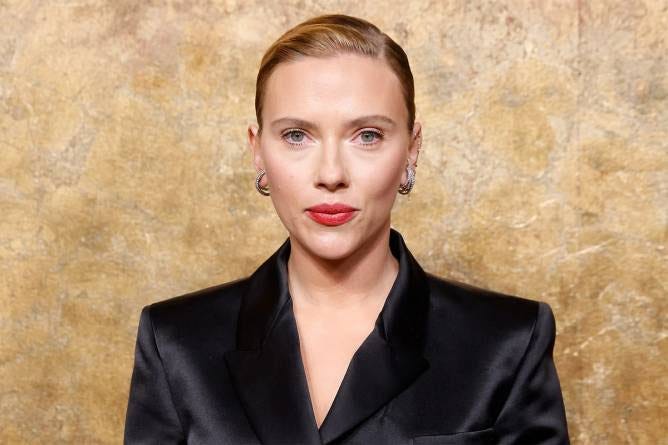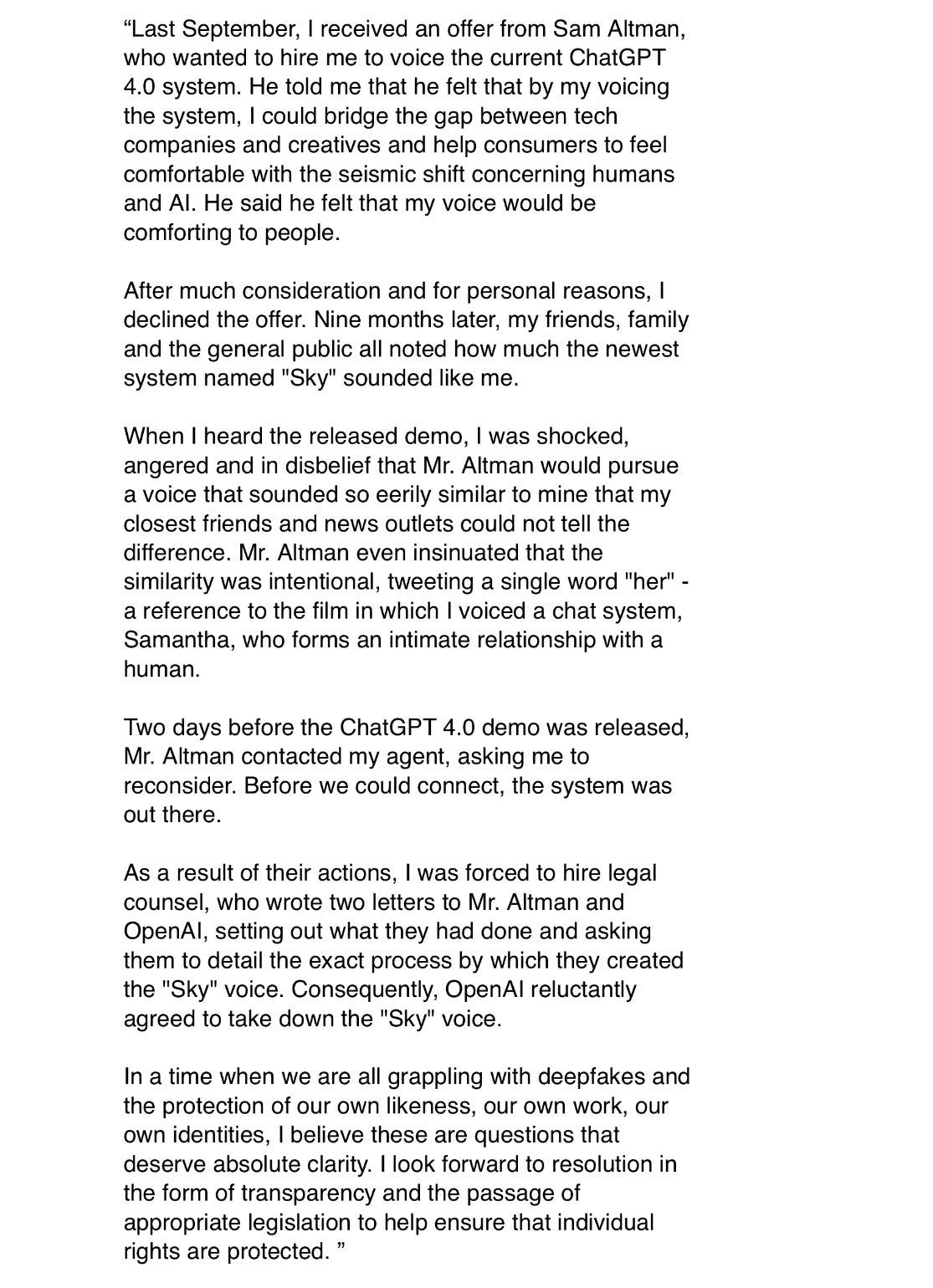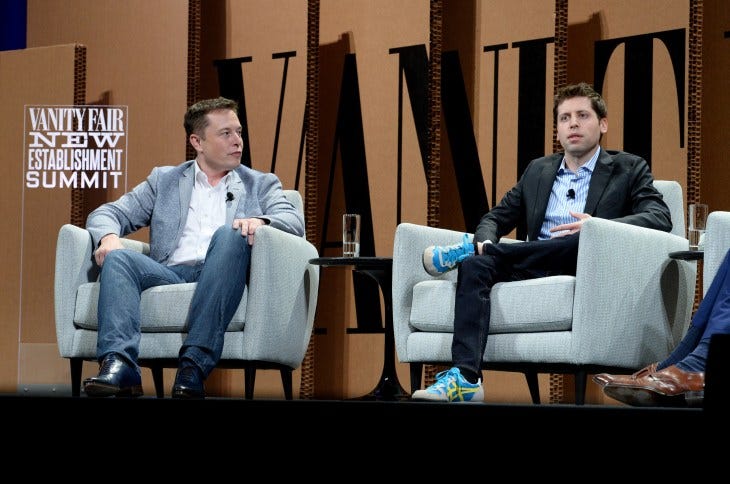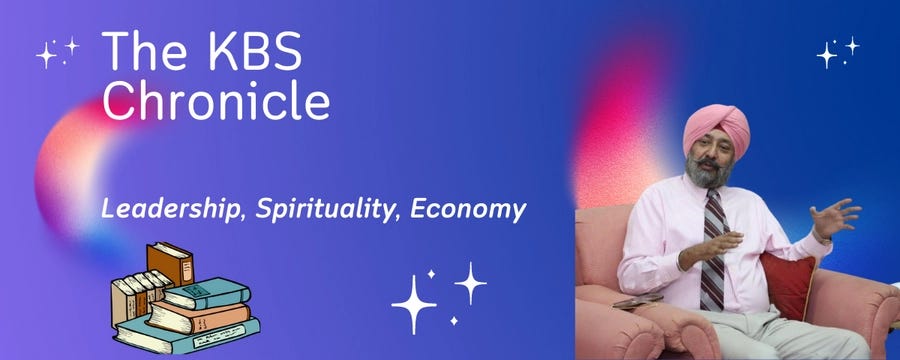Scarlett Johansson vs. OpenAI: A Legal Showdown in the AI Era
The Dispute Unveiled
"An old adage says, 'Every donkey loves his bray,' but in this case, the sentiment is quite different. Typically, we might say that everyone loves the sound of their own voice, but Scarlett Johansson was so upset that she called her lawyers when she discovered that a true likeness of her voice was emerging from unexpected sources. Johansson and her team of attorneys sent two letters to OpenAI, demanding the company reveal how it created a voice assistant that sounded eerily similar to the A-list actress’s voice. This incident raises significant questions about the ethical and legal boundaries in the rapidly advancing field of artificial intelligence.
OpenAI's Dubious Decision
Last week, OpenAI unveiled a demo of its new ChatGPT-4o model with “Voice Mode,” an AI assistant capable of answering questions in one of five voice options. Among these, one voice sounded so similar to Johansson’s that it prompted a public statement from her. What made the situation more contentious was Johansson’s revelation that OpenAI CEO Sam Altman had approached her nine months earlier, requesting her to be the voice of the model—a proposal she declined. Just days before the release of the feature, Altman reached out again. However, before Johansson could respond, Voice Mode was launched, leading to widespread speculation and backlash.
Scarlett Johansson's Public Stand
Johansson’s public statement highlighted the audacity of OpenAI’s move. Despite the company’s denial of using Johansson’s voice and their claim of working with casting directors to sift through 400 voice actor submissions, the situation seemed far from coincidental. Johansson’s proactive approach in calling out OpenAI underscores the need for stringent measures to protect individuals’ likenesses in the age of AI. Her courage to address the issue publicly not only protects her rights but also sets a precedent for others facing similar challenges.
OpenAI's Response
In response to the backlash, OpenAI announced it would suspend the contentious voice. This move, albeit reactive, indicates the complexities companies face when navigating the ethical minefield of AI advancements. The fact that Altman referenced Johansson’s role in the 2013 film “Her” in a post on X adds another layer to the controversy, blurring the lines between homage and infringement.
Johansson's Legal History with Major Corporations
This isn’t ScarJo’s first rodeo. The Black Widow star previously sued Disney in 2021 over the dual streaming and theatrical release of her Avengers origin movie, alleging the entertainment giant broke her contract and cost her significant box-office earnings. The lawsuit was settled out of court for an undisclosed sum, showcasing Johansson’s willingness to take on industry giants to defend her rights.
Foreseeing and Resolving Similar Issues
The 2023 SAG-AFTRA strike, part of a broader wave of Hollywood labour disputes, highlighted the industry's proactive stance on similar problems. The strike, driven by economic fairness and the regulation of artificial intelligence, forced the industry to confront the potential replacement of human actors with AI and digital recreations. The resolution of the strike, which lasted from July to November 2023, included significant changes such as improved compensation for actors and stringent regulations on AI use. This collective action showcased that sweeping such issues under the carpet was no longer viable. Instead, it emphasised the necessity for equitable compensation for actors' unique voices and likenesses, protecting their personal brands and ensuring fair treatment in the digital age.
Protecting Personal Brands in the AI Era
The SAG-AFTRA strike's resolution set a precedent for how the industry should handle the use of actors' voices and likenesses in AI-generated content. Key features of the agreement required studios to obtain explicit consent and provide fair compensation to actors whenever their digital doubles appeared on screen. This includes both employment-based and independently created digital replicas. Moreover, the agreement established regular meetings between SAG-AFTRA and the AMPTP to ensure compliance and adapt to evolving AI technology. These measures underscore the importance of safeguarding individuals' intellectual property rights (IPR) in the face of technological advancements. As AI continues to develop, it is crucial to maintain robust protections for creative professionals to prevent the erosion of job opportunities and ensure that everyone is fairly compensated for their contributions to the industry.
Summing Up: Adapting Legal Frameworks for the AI Era
As technology continues to gallop ahead, the scope and nature of legal disputes evolve rapidly. The Scarlett Johansson vs. OpenAI saga exemplifies a broader trend where AI-generated content intersects with the protection of individual likenesses. This case highlights the urgent need for our legal frameworks to adapt to technological innovations. Ensuring robust protections against the unauthorized use of work and likeness is crucial in maintaining ethical standards in the digital age. Johansson's courage in publicly addressing the issue and her history of standing up to major corporations set a powerful example.
For OpenAI and its star CEO, Sam Altman, this serves as a valuable lesson. Ignoring such issues or riding roughshod over them may not only lead to costly legal disputes but also damage the credibility of both the company and its CEO. Altman, who has already faced criticism from OpenAI's Board for not being "consistently candid," risks further harm to his and the company's reputation. As AI technology evolves, our legal systems and the leadership’s ethical value-system must progress to ensure the ethical and fair use of creative works and personal likenesses, safeguarding the brand equity and reputation of leading AI companies.







